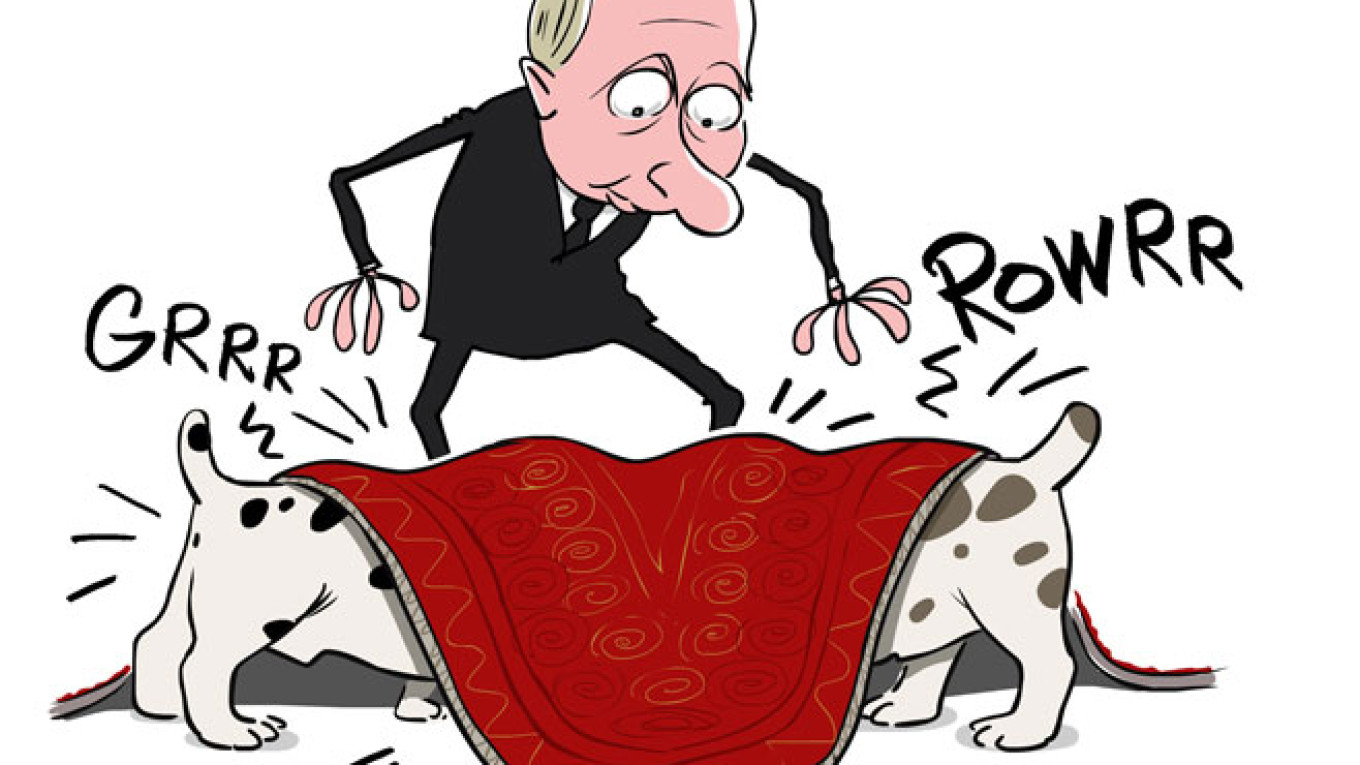To succeed as an "expert" in Russia these days it is necessary to not only love President Vladimir Putin with all your heart, but also have a very short memory — and preferably no memory at all. Otherwise, every time the president reverses a previous decision, you might have the seditious thought that Putin occasionally makes mistakes.
As a case in point, Putin has decided to eliminate two government agencies — the Federal Service for Defense Contracts, or Rosoboronzakaz, and the Federal Agency for Weapons Procurement, or Rosoboronpostavka — with the Defense Ministry and other agencies taking over their functions.
The first was responsible for formulating defense contracts, managing tenders and auctions, and determining which companies could carry out particular tasks. The second ensured that orders were completed on time and to quality standards.
No sooner was that decision announced than pro-Kremlin experts rushed to affirm that both organizations had sprung from the evil mind of former Defense Minister Anatoly Serdyukov and that Putin was only correcting Serdyukov's mistakes.
In fact, both agencies were the brainchild of then Defense Minister and now all-powerful Kremlin chief of staff Sergei Ivanov. His argument for creating them was that the agencies would end corruption by removing Defense Ministry brass from the process of formulating state orders.
Now that Putin is abolishing those agencies, the government must admit either that corruption was finally defeated or that it, in fact, won out. Given that Russia's military-industrial complex has displayed an obvious inability to fulfill Putin's ambitious rearmament plans, it appears that the agencies did not succeed in their assigned tasks.
But simply creating or eliminating purely bureaucratic agencies can never solve the military's issues because structural reforms are needed. Besides corruption, Russia's defense industry is plagued by ineffective management of the state corporations, the government's inability to build industrial corporations, aging production facilities and the fact that young people are reluctant to work in stagnant industries.
However, military officials are more concerned with the billions of dollars they can pocket once they have access to defense contracts. Bureaucratic maneuverings, as such, are not genuine efforts toward reform but ways to determine who will have a chance to enrich themselves and who will not. Now that Russia is locked in a confrontation with the treacherous West and budgetary resources are diminishing, leaders are clearly concerning themselves with the question of who will get the biggest piece of the military-industrial pie.
And despite the publicized need for greater economy, the Kremlin insists that the plan to modernize the military at a cost of 20 trillion rubles must be completed. And so, as resources dry up elsewhere, the military-industrial complex becomes an increasingly appetizing cash cow for anyone who can get their hands on it.
Now it seems a ruthless battle has begun among the bulldogs in the military-industrial complex. Putin has decided to personally head the Military-Industrial Commission, formerly the preserve of Deputy Prime Minister Dmitry Rogozin, and countless experts have speculated as to whether Rogozin's authority has increased or decreased as a result.
On one hand, Rogozin lost a very influential job as head of that commission, but on the other hand, he is now Putin's only first deputy on the commission. That gives Rogozin the opportunity to prepare decisions worth tens of billions of rubles, each of which will carry Putin's personal blessing.
Considering that Rogozin represents the defense industry, it would seem that side has won a landslide victory, such that the military will have no choice but to pay whatever price the industry demands.
However, Defense Minister Sergei Shoigu has just successfully completed an "end run" maneuver that he had begun a few months ago. In early summer, Shoigu proposed that Putin abolish Rosoboronzakaz, the agency that Rogozin had barely managed to wrest free from the control of then Defense Minister Anatoly Serdyukov in 2012.
At first glance, it would seem there was no reason for the move: Rosoboronzaka controlled only the fulfillment of state orders, not their disbursement — and therefore, not cash flows. However, as an experienced PR man, Rogozin hoped that control over the agency would enable him to accuse the Defense Ministry of its inevitable failure to fulfill defense orders.
Shoigu guessed his intentions and shrewdly carried out a blocking maneuver. He more than succeeded in his goal: Putin has eliminated not only Rosoboronzakaz, but also Rosoboronpostavka. What's more, Deputy Defense Minister Yury Borisov was named secretary of the Military-Industrial Commission. It turns out that the military, and not Rogozin's team will set the agenda for the commission's meetings and prepare all of its decisions. That means Sergei Shoigu will control the financial flows.
Of course, these bureaucratic games in no way address the very real problems the military-industrial complex is facing, but they do enable the winners to build themselves another villa or two in Crimea. It is a pity that Western sanctions make it impossible for them to build their villas in Nice, but at least Crimea definitely belongs to Russia now.
Alexander Golts is deputy editor of the online newspaper Yezhednevny Zhurnal.


